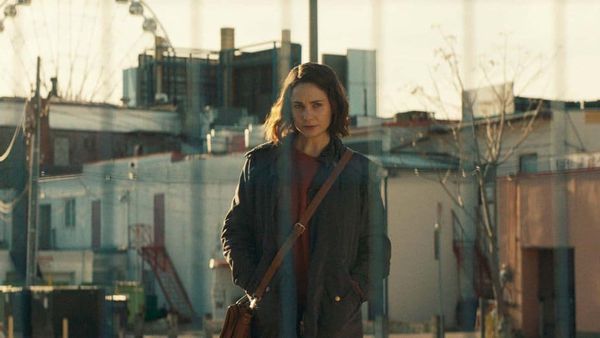Eye For Film >> Movies >> Disappearance At Clifton Hill (2019) Film Review
Disappearance At Clifton Hill
Reviewed by: Jennie Kermode

If Clifton Hill were in the UK, it would be a seaside town, somewhere once fashionable but latterly neglected, with one of those beaches where the sea never makes an appearance until it comes crashing in faster than a man can run, as the warning signs used to say. The Canadian equivalent of such a place, imbued with a similar sense of desolation in the off season, Clifton Hill is perched beside Niagara Falls, where you can't see the water but you can't escape its low, ominous rumbling. It's a place where you can still find video game arcades, a place where bitter comedians who once had TV shows perform on tiny stages before boozed-up tourists, a place of bric-a-brac shops and ugly plastic souvenirs and magic shows performed with bored-looking live tigers. The sort of place which, when you stroll through it, will make you feel as if nothing at all has happened since you were a child.
Abby (Tuppence Middleton) used to live in Clifton Hill. Her sister still does, and she's come back to visit after once again messing up her life somewhere else; another failed relationship, another request for financial support until she can get back on her feet. It's clear from the moment we meet her that something about her is off, but not clear how much of this stems from serious mental disturbance and how much is down to a habit of malingering. Whatever it is, it may have its roots in an incident that occurred in the woods just outside the town when she was a child. Her memory has been dulled by time but she distinctly recalls seeing a boy a few years her senior dragged off against his will into a car. She tried to tell her family but they thought she was just making up stories, an accusation she has become used to.

Now that she's back, Abby can't get that memory out of her head. Her decision to report it to the police - and, subsequently, to try and investigate it herself - threatens to uncover all sorts of seedy goings on in a quiet neighbourhood. It leads her into the orbit of diver and conspiracy theorist podcaster Walter (David Cronenberg), who believes she's on the trail of something related to his own obsessions. It also leads her to suspect local tycoon Charlie (Eric Johnson), who is coincidentally trying to buy the motel her recently deceased mother left behind, which she has vague ideas about restoring. But there is much more to this story, which unfolds layer upon layers until an encounter at customs that will force you to second guess everything that has gone before, and a final twist which once again calls key events and supposed motives into question.
Saturated as it is with unreliability and delusion, this is a film that relies heavily on atmosphere to keep viewers involved, and which invites us to engage with characters emotionally so that we can find our way through the story using instinct where reason falls short. For this it needs stellar performances, and it gets them. Middleton is remarkable, doing far more as an actor than is initially apparent and somehow continuing to attract sympathy when one might expect it to become impossible. Cronenberg also succeeds in making a difficult character compelling and letting us see as human what might in lesser hands have felt like parody. Director Albert Shin balances these performances with real skill. Whilst the mechanics of the central mystery may be simpler than some viewers would like, the real puzzle lies in the people who form its working parts. The psychological is more important than the procedural, and Shin uses every aspect of his setting, from the empty space at the centre of the motel to the lake from which Walter first emerges, to speak to the psychology of his characters.
A curious and haunting film, Disappearance At Clifton Hill is the sort of thing that doesn't come along very often. It has a haunting quality that will stay with you in the way that Abby's shocking childhood experience stayed with her. It reminds us that the worst horrors are usually rooted in the mundane, yet its methods are anything but. Enhanced by atmospheric sound design and the sort of cinematography that puts character before beauty but often captures both, it asks its viewers to look and keep looking, but it's what you don't quite see that makes the magic work.
Reviewed on: 22 Feb 2020
















